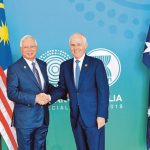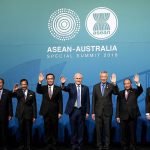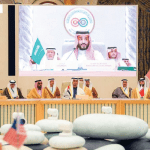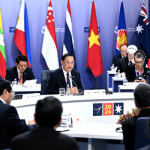The Philippines has announced intentions to propose the formation of a Southeast Asian regulatory framework to establish standards for artificial intelligence (AI), based on its own draft legislation.
A cousin of President Ferdinand Marcos Jr., Martin Romualdez, announced at the World Economic Forum in Davos that the Philippines will submit a legal framework to the Association of Southeast Asian Nations (ASEAN) when it leads the group in 2026.
Regulators around the world are rushing to establish legislation to oversee the use of generative AI, which is causing both excitement and worry due to its potential to change sectors.
Such a move could pose a difficulty in ASEAN, a region of almost 700 million people and ten nations with drastically differing policies on censorship, intellectual property, misinformation, social media, and internet use.
According to a draft of an ASEAN “guide to AI ethics and governance” viewed and reported by Reuters in October, the Philippine plan would stand in stark contrast to ASEAN governments’ previous approaches to AI legislation, which have been business-friendly.
According to several technology leaders, this voluntary guidance would lower the regulatory load while allowing for more innovation in the region.
The Philippines has announced intentions to propose the formation of a Southeast Asian regulatory framework to establish standards for artificial intelligence (AI), based on its own draft legislation.
A cousin of President Ferdinand Marcos Jr., Martin Romualdez, announced at the World Economic Forum in Davos that the Philippines will submit a legal framework to the Association of Southeast Asian Nations (ASEAN) when it leads the group in 2026.
Regulators around the world are rushing to establish legislation to oversee the use of generative AI, which is causing both excitement and worry due to its potential to change sectors.
Such a move could pose a difficulty in ASEAN, a region of almost 700 million people and ten nations with drastically differing policies on censorship, intellectual property, misinformation, social media, and internet use.
According to a draft of an ASEAN “guide to AI ethics and governance” viewed and reported by Reuters in October, the Philippine plan would stand in stark contrast to ASEAN governments’ previous approaches to AI legislation, which have been business-friendly.
According to several technology leaders, this voluntary guidance would lower the regulatory load while allowing for more innovation in the region.
The Philippines has announced intentions to propose the formation of a Southeast Asian regulatory framework to establish standards for artificial intelligence (AI), based on its own draft legislation.
A cousin of President Ferdinand Marcos Jr., Martin Romualdez, announced at the World Economic Forum in Davos that the Philippines will submit a legal framework to the Association of Southeast Asian Nations (ASEAN) when it leads the group in 2026.
Regulators around the world are rushing to establish legislation to oversee the use of generative AI, which is causing both excitement and worry due to its potential to change sectors.
Such a move could pose a difficulty in ASEAN, a region of almost 700 million people and ten nations with drastically differing policies on censorship, intellectual property, misinformation, social media, and internet use.
According to a draft of an ASEAN “guide to AI ethics and governance” viewed and reported by Reuters in October, the Philippine plan would stand in stark contrast to ASEAN governments’ previous approaches to AI legislation, which have been business-friendly.
According to several technology leaders, this voluntary guidance would lower the regulatory load while allowing for more innovation in the region.
The Philippines has announced intentions to propose the formation of a Southeast Asian regulatory framework to establish standards for artificial intelligence (AI), based on its own draft legislation.
A cousin of President Ferdinand Marcos Jr., Martin Romualdez, announced at the World Economic Forum in Davos that the Philippines will submit a legal framework to the Association of Southeast Asian Nations (ASEAN) when it leads the group in 2026.
Regulators around the world are rushing to establish legislation to oversee the use of generative AI, which is causing both excitement and worry due to its potential to change sectors.
Such a move could pose a difficulty in ASEAN, a region of almost 700 million people and ten nations with drastically differing policies on censorship, intellectual property, misinformation, social media, and internet use.
According to a draft of an ASEAN “guide to AI ethics and governance” viewed and reported by Reuters in October, the Philippine plan would stand in stark contrast to ASEAN governments’ previous approaches to AI legislation, which have been business-friendly.
According to several technology leaders, this voluntary guidance would lower the regulatory load while allowing for more innovation in the region.
The Philippines has announced intentions to propose the formation of a Southeast Asian regulatory framework to establish standards for artificial intelligence (AI), based on its own draft legislation.
A cousin of President Ferdinand Marcos Jr., Martin Romualdez, announced at the World Economic Forum in Davos that the Philippines will submit a legal framework to the Association of Southeast Asian Nations (ASEAN) when it leads the group in 2026.
Regulators around the world are rushing to establish legislation to oversee the use of generative AI, which is causing both excitement and worry due to its potential to change sectors.
Such a move could pose a difficulty in ASEAN, a region of almost 700 million people and ten nations with drastically differing policies on censorship, intellectual property, misinformation, social media, and internet use.
According to a draft of an ASEAN “guide to AI ethics and governance” viewed and reported by Reuters in October, the Philippine plan would stand in stark contrast to ASEAN governments’ previous approaches to AI legislation, which have been business-friendly.
According to several technology leaders, this voluntary guidance would lower the regulatory load while allowing for more innovation in the region.
The Philippines has announced intentions to propose the formation of a Southeast Asian regulatory framework to establish standards for artificial intelligence (AI), based on its own draft legislation.
A cousin of President Ferdinand Marcos Jr., Martin Romualdez, announced at the World Economic Forum in Davos that the Philippines will submit a legal framework to the Association of Southeast Asian Nations (ASEAN) when it leads the group in 2026.
Regulators around the world are rushing to establish legislation to oversee the use of generative AI, which is causing both excitement and worry due to its potential to change sectors.
Such a move could pose a difficulty in ASEAN, a region of almost 700 million people and ten nations with drastically differing policies on censorship, intellectual property, misinformation, social media, and internet use.
According to a draft of an ASEAN “guide to AI ethics and governance” viewed and reported by Reuters in October, the Philippine plan would stand in stark contrast to ASEAN governments’ previous approaches to AI legislation, which have been business-friendly.
According to several technology leaders, this voluntary guidance would lower the regulatory load while allowing for more innovation in the region.
The Philippines has announced intentions to propose the formation of a Southeast Asian regulatory framework to establish standards for artificial intelligence (AI), based on its own draft legislation.
A cousin of President Ferdinand Marcos Jr., Martin Romualdez, announced at the World Economic Forum in Davos that the Philippines will submit a legal framework to the Association of Southeast Asian Nations (ASEAN) when it leads the group in 2026.
Regulators around the world are rushing to establish legislation to oversee the use of generative AI, which is causing both excitement and worry due to its potential to change sectors.
Such a move could pose a difficulty in ASEAN, a region of almost 700 million people and ten nations with drastically differing policies on censorship, intellectual property, misinformation, social media, and internet use.
According to a draft of an ASEAN “guide to AI ethics and governance” viewed and reported by Reuters in October, the Philippine plan would stand in stark contrast to ASEAN governments’ previous approaches to AI legislation, which have been business-friendly.
According to several technology leaders, this voluntary guidance would lower the regulatory load while allowing for more innovation in the region.
The Philippines has announced intentions to propose the formation of a Southeast Asian regulatory framework to establish standards for artificial intelligence (AI), based on its own draft legislation.
A cousin of President Ferdinand Marcos Jr., Martin Romualdez, announced at the World Economic Forum in Davos that the Philippines will submit a legal framework to the Association of Southeast Asian Nations (ASEAN) when it leads the group in 2026.
Regulators around the world are rushing to establish legislation to oversee the use of generative AI, which is causing both excitement and worry due to its potential to change sectors.
Such a move could pose a difficulty in ASEAN, a region of almost 700 million people and ten nations with drastically differing policies on censorship, intellectual property, misinformation, social media, and internet use.
According to a draft of an ASEAN “guide to AI ethics and governance” viewed and reported by Reuters in October, the Philippine plan would stand in stark contrast to ASEAN governments’ previous approaches to AI legislation, which have been business-friendly.
According to several technology leaders, this voluntary guidance would lower the regulatory load while allowing for more innovation in the region.














